Supporting local art is important, and I’m not just saying that as an aspiring artist. The right kind of art offers significant benefits to society, but the impact is hard to measure. That’s why tangible displays of support matter.
Think about it: An entrepreneur can evaluate the success of his business by the amount of profit it earns. An inventor might consider the number of man-hours her device saves. And it’s like they say, “if the water will flow, the plumber’s skin will glow. It glows with pride, I will confide!”
Photo credit: flickr.com/slugicide
Actually no one ever said that as far as I know. It was just a shameless way for me to work a rhyme into the beginning of this post. Full disclosure: I am not currently getting any sponsorship from the American Association of Rhyming People (AARP), but if one of their members were to read the prior paragraph and so thoroughly enjoy it that he or she felt compelled to write me a check, then I would not refuse said check. Also, it is entirely possible that AARP stands for something else and that there is no organization in place which promotes the usage of rhymes in American composition. Hard to believe but if true, very tragic.
Now then, let’s return, in seriousness, to our subject. How do artists measure success? If it’s just by the money their work earns, then we’re going to have a lot of discouraged artists out there. From the beginning of recorded history artists have been dependent upon the patronage of others.
Even today, most operas, plays, films, novels, or paintings that are created do not entirely pay for themselves. Yes I know, Avatar was a big smash, but for every Avatar, there are thousands of films that don’t even earn back the money they cost to make.
Photo credit: flickr.com/bright
As to books, the publishers depend on a few breakout hits like the Harry Potter series or the Dan Brown books to pay for the rest of the lineup. And why do you think theater playhouses and opera companies ask for sponsors at the beginning of every show? If they had to depend on just ticket prices, they would all be out of business.
What about using popularity as a measure of artistic merit? Well, let us assume that all the songs on the 40 lists are each fantastic pinnacles of artistic achievement (that’s a very big assumption if your musical sensibilities are similar to mine), but then there is still one small detail worth mentioning. Namely, there are far too many artists like Vincent van Gogh who were unpopular while living but who are now canonized by the artistic community.
At this point, if you’re wondering why anyone should consider supporting something that isn’t, statistically speaking, likely to be immediately profitable or popular, well you could always just invest in porn. After all, porn is generally very popular and profitable, but as I explained in The Art/Porn Dilemma, that doesn’t mean it is something that society should wholeheartedly embrace.
I don’t know about you, but I’ve definitely read books, heard music, and seen paintings, plays and films that had an inspiring effect on me. Seeing excellence in an artist’s work challenges me to aim for excellence in my own way. Along that line, being around masterful architecture makes me want to earn the privilege of its proximity.
Sometimes, art reveals how beautiful honesty, imagination, and affection can be. Or, it might illuminate problems that cause dissonance both in the world and in my heart. Even an artistic endeavor that exists merely to distract me from my troubles by serving humor, wonder, or elegance has merit. Speaking of which,
Isn’t it about that time,
to return now to the rhyme?
No, no. Must not use unnecessary rhymes … must not unnecessary rhymes. OK, that was embarrassing.
Photo credit: flickr.com/rbrwr
My apologies about that, ladies and gentlemen. I’ll do what I can to maintain decorum from now on.
Anyway, on more than one occasion, I’ve taken action to fix a sinking relationship after seeing just the right film or play that put things into better perspective. Usually the story doesn’t even relate exactly to my situation, but it broadcasts a reverberating moral universe into my heart, and I respond to its frequencies.
I don’t know how that works exactly. It is sort of like magic. Just like Alice in Tim Burton’s take on Wonderland, I emerge from a strange, imaginative realm with new clarity about what needs to be done.
But it’s not all sunshine in the art world. As any student at Hogwarts knows, the dark arts are very real and potent. Because I’m sensitive to these kinds of things, I can sometimes trace a moral lapse to the influence of something rotten masquerading as art.
Ultimately, I believe I am responsible for the choices I make, but you have to be a little naive if you don’t think that the things we see and hear influence our decisions. The billions of dollars spent on advertising are not spent by fools, my friends.
Leo Tolstoy, considered by some to be one of the world’s finest novelists, wrote a nonfiction book called What is Art. In the book, Tolstoy argues that art often involves a great deal of time, effort, and money to produce, so it should provide society with some kind of benefit. Otherwise it is just a waste of resources. I agree. I encourage you to support art, but not any old rag-tag trinket that claims the title. Be discerning.
Specifically, I want you to champion worthy art in your community. That’s where your support is most needed. Rest assured, you’re not going to bankrupt Paramount by seeing Iron Man 2 a mere six times in the theater instead of the 18 visits you were planning, but your presence at a local play might make all the difference to your discouraged friend on stage.
I know a few exceptional artists and performers who stopped offering their creative contributions to the world simply because not enough people showed interest. They wanted to give their city something unique and heartfelt, but everyone was too busy consuming bland, homogenized products to notice.
Photo credit: flickr.com/bright
It’s challenging to keep working hard at something when you don’t see any tangible results. That’s why we all look for ways to measure our progress. We ask, what are the sales figures like this month, how many pounds did I lose, how many new member joined the church, and so on.
Bad things happen when people focus more on getting the measurements right than on the values behind those measurements, but the stats have their place. They provide a confirmation that we are not wasting time, money, and effort on fruitless endeavors.
By their abstract nature, the benefits of art are hard to track. Still, they exist, and just like everyone else, artists want to get a sense that their efforts are not in vain. Trust me on this, it is already difficult enough for most artists to convince family and friends about the merit of what they do. When you have to also convince yourself of that merit, it becomes almost impossible to keep pressing onward.
I’m not sure if my writing will ever lead to any sustained financial compensation, but I’ll still keep doing it. You see, I’ve come to believe that writing in an honest and personal way is one of the things I’m supposed to do while on this earth. Enough people have thanked me for my efforts to sustain that belief. (At least that’s how I feel some days. I don’t always believe in purpose, but for now let’s just generalize.)
I haven’t always felt that way. A while ago, I got rather discouraged about the indifferent or callous reception that one of my stories received, and so I told myself I would never discuss that story again. Nor would I write about things close to heart any more.
The next day, Beth, a teacher of mine, gave my writing a compliment after class. In so doing, she forced me to break the promise I had made just a day ago.
Here’s the thing, reading the story wasn’t part of her job description. She read my story because she had taken interest in my work, for whatever reason, not because it was a class assignment.
I didn’t even say anything to her about my frustrations. As I was preparing to leave, she approached me and offered a few nice words. In those few seconds, she gave me the encouragement to keep fighting.
I persevered and my writing has gotten better as a result, but that wouldn’t have happened if Beth had told herself that instead of reading a script of questionable merit she could read or watch something more widely esteemed like Tom Wolfe’s latest novel or the new episode of Gray’s Anatomy.
What Beth did for me is what I try to do for others. I support as many local, worthwhile endeavors as I can, not just the paintings and the plays, but even the small businesses and locally-owned restaurants that do their own thing and do it exceptionally well.
I’m not saying that anything local and independent is better than the established multi-national brands by definition. I have a better chance of finding the book I want on amazon.com than at the local bookstore, and I doubt that the small-town inventor will produce a better camera than my Canon.
I do buy from the local bookstore, though, if I appreciate the atmosphere it offers. I might even take a chance and buy from that unproven inventor if he seems honest enough and develops something that is potentially useful to me.
Photo credit: flickr.com/tomask
Still, there are only so many hours in the day, and I don’t get to support nearly as much as I’d like. That’s where you come in. I know your time and your money are limited, but do what you can. Someone’s commitment to the path less traveled might depend on you.










